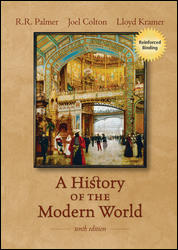
History of the Modern World, 10th Edition (Palmer)Chapter 16: Europe's World Supremacy, 1871-1914Chapter OverviewIn the last two decades of the nineteenth century, the western, industrialized powers divided most of the world among themselves. The new imperialism was motivated by material incentives, such as the need for raw materials or the search for new materials, but religious and humanitarian impulses, the so-called civilizing mission of the imperialists, also played a role. In the Americas, the U.S. justified its imperialist ambitions by claiming to protect countries like Mexico from European ambitions. In Europe, the decline of the Ottoman empire provoked a scramble between European powers for control of the Balkans, Egypt, and Turkey. Early attempts at international regulation of colonialism in Africa failed, and rivalry embittered the relations between the principal contenders, Britain, France, and Germany. In Asia, the Dutch and British ruled through a civil service, but a rebellion in India prompted a change of British policy. Russian interests in Asia led to tensions with Britain and war with Japan. The Chinese faced a double threat from European and Japanese imperialism, but were ultimately forced to open their country to European traders through a series of wars. Meanwhile, Japanese aggression provided useful lessons to both Europeans and the colonized peoples of Asia. |  |















